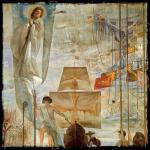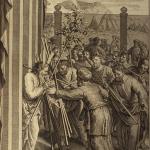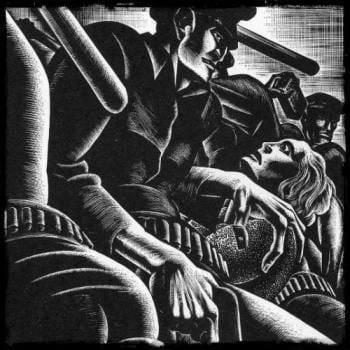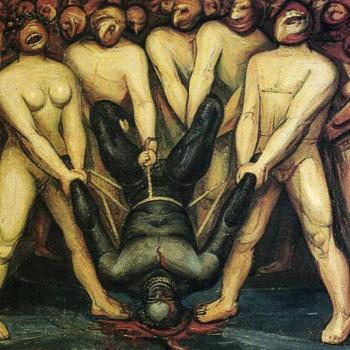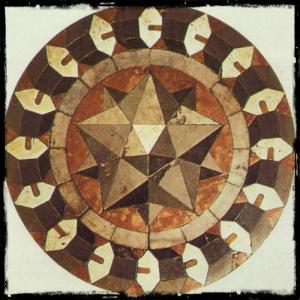
Collegiate gothic citadel of learning in a historic, picturesque town roughly equidistant from New York and Philadelphia, from Boston and Washington, DC, Princeton University is proximate to urban centers of wealth and power, while remaining demurely provincial and unassuming (the town is a mere 5-minute ride from the Northeast Rail Corridor via the terminally adorable Dinky, a single-car train that departs regularly from the Princeton campus).
Perhaps unsurprisingly, then, Princeton (both the town and the university, actually) has a bit of a Stepford Wives quality, its refined academic patina and bland cosmetic perfection dissembling the extent to which rampant egos and unbridled wealth and power imperatives inflect the dispensation of emoluments and influence.
Which brings us to Professor Robert P. George of Princeton University, Catholic moral philosopher, ethical evangelist, social reformer, and influential whisperer to conservative U.S. intellectuals and politicians.
Introducing Robby George
Robby George holds the McCormick Chair in Jurisprudence at Princeton (an honorific also bestowed upon Woodrow Wilson back in the day). Somewhat owlish in appearance (with a square face, large head, and glasses), unfailingly formal (his uniform the three-piece suit), and possessing an intimidating academic pedigree (Swarthmore BA, Harvard JD, Oxford PhD) alongside aw-shucks, finger-picking-good, banjo-playing, West Virginia origins, George is disarmingly likeable. He professes to be (and by almost all accounts is) one of those rare souls who has been ravished by ideas.
Robby George’s commitment to the life of the mind and to the pursuit of truth, his passion for intellectual swordplay, has also famously coexisted with an abiding capacity for friendship with others (most famously, Cornel West) who may not agree with him on existential values or public policies, but who share with him a zeal for ideas (and for ideals), and for whom deep thought provides the ground of their being..
All the more reason to be clear that Robby George is a complicated fellow. Honoring that complexity means we need to hold in place what we might call his intellectual and emotional virtues. At the same time, we must be real about the extent to which George’s persona itself (no limpid pool of grace for R.G., as for the rest of us) might tactically serve as an agency of misdirection.
Indeed, Robby George’s facsimile of a decent, caring person diverts our view from his deep and complicit engagement with some pretty terrifying people, organizations, practices, ideas in the policy realms of family, marriage, gender, sexuality, women’s reproductive health, medical ethics, school choice, religious freedom, and foreign policy. Terrifying less because of the dogmatic and reactionary specifics of the policy commitments. More because of the bizarrely twisted and arbitrary ethical, theological, and philosophical premises and infrastructure of these commitments.
In other words, the revealed religion foundations of Robby George’s natural law worldview should terrify us because they misdirect our focus and resources away from escalating existential threats to our species, and to life on this planet. One must appreciate the enormous irony insinuated by this claim, of course, given the spiritually self-righteous and self-justifying In-God-We-Trust affirmations of this worldview.
But that tragicomic irony is the heart of the matter. Because the Abrahamic, creator-centric assumptions of this worldview beckon Robby George (and far too many of the rest of us) into a simple-minded, morally constrained, empirically empty, and logically befuddled deontological scheme that strips from humanity, generally, the actual grace inherent in its complexity as a species, crouched and confused, at the summit of an unfathomably remarkable creation that needs no justification beyond itself.
Christianity at Princeton
We’ll get to Robby George’s ideas about natural law, and subsequently dig even more deeply into the influence of revealed religion on concepts of natural law, and the implications of this influence for the future of our planet. For now, we simply need to consider that Robby George’s significance for the conservative insurgency in American politics has as much (or more) to do with the institutional empire he has built at Princeton than with the ideas he uses this institutional empire to disseminate.
A few relevant points about Christian worship and Christian ideas in Princeton. With one modest, main street Catholic church, several historically prominent and well-heeled Presbyterian and Methodist congregations, and, on campus, one gorgeous medieval-inspired, interfaith Gothic “chapel”, Princeton blandly accommodates a full complement of Christian dispositions and faiths, without hewing to any with any particular intensity.
Like most aspects of life in Princeton, churching is comfortable and expedient, and so an unlikely location for rigorously ordered and applied religious thought. Which perhaps explains why an Onward Christian Soldiers gestalt emerged, not from Princeton’s religious institutions (not, even, from the town’s renowned, and quite theologically conservative, Presbyterian seminary), but from the university’s Politics department.
Catholic natural law philosophy flourishes at Princeton via two institutions Robby George has birthed, nurtured, and funded from his perch within the Politics Department: The Witherspoon Institute and the James Madison Program in American Ideals and Institutions. Both of these organizations are the products of what we might call the right-wing, Catholic-infused “intellectual-industrial complex” spawned by nonprofit foundations that secure the tax-advantaged funds of incredibly (unspeakably) wealthy heartland businessmen and deploy them through a network of (mostly) east coast think tanks and advocacy institutions.
Multiple ironies accompany the attachment of these two benign-seeming namesakes – Witherspoon and Madison – to the straight-laced missions of these two programs.
John Witherspoon (son of the Scottish Enlightenment, renowned educator and moral philosopher, Princeton University president during the Revolutionary War era, leading light of the Continental Congress, signer of the Declaration of Independence, and tutor to James Madison) married a 24-year old woman at the age of 68 and subsequently sired two children with her (to accompany the 10 children he fathered with his first wife).
The other being that little Jemmy Madison himself, all 5’4” and 100 pounds of him, was a Deist whose contributions to the debates surrounding the Constitution illuminated for posterity an especially nuanced and flexible political mind, attuned to Enlightenment perspectives of natural rights emerging alongside civil society from the state of nature, but not particularly focused on or concerned with Christian-Classical concepts of moral philosophy and natural law.
The Witherspoon Institute
The Witherspoon Institute is “an independent research center that works to enhance public understanding of the moral foundations of free and democratic societies.” The Institute runs two education centers, each of which frankly and forthrightly declare what many people (particularly those not sufficiently initiated into the philosophical labyrinth of Catholic doctrine) might presume were obfuscatory prolegomena to a medieval counter-reformation not dissimilar to the Inquisition or, closer to home (closer to Harvard, certainly), The Handmaid’s Tale:
- The Simon Center on Religion and the Constitution – “dedicated to examining church-state legal doctrines in American constitutional thought and restoring and defending the understanding of religious liberty and the place of religion in American public life that our Nation’s founders set forth in the text of the Constitution.”
- The Center on the University and the Intellectual Life – which operates on the premise that the diseased foundations of higher education endanger a free society and thus require “faculty and programs within universities supported and supplemented by programs working independently but along-side the university—the university now requires outside help to live up to its highest ideals, not in competition but in a supporting and complementing role.”
Witherspoon also supports a myriad of (quite controversial) research and publishing projects (focused on Science and Ethics; Family, Marriage, and Democracy; Political Thought and Constitutional Government; Ethics, Culture, and Economic Development; and Religion and Civil Society), allowing the Institute to achieve the remarkable feat of combining within its modest (although not too modest) dispensation the research, publishing, and education initiatives separately pursued by the Heritage Foundation and Federalist Society.
The Witherspoon Institute exists independently of Princeton University, but still benefits from courses it offers that cater to Princeton undergraduate and graduate students (as well as to high school students during the summer months, including a seminar with the theme of Moral Life and the Classical Tradition scheduled for the summer of 2019, with separate units, in separate weeks, for men and women). Other summer seminars sponsored by the Institute include Medical Ethics: A Natural Law Perspective (for medical students); Natural Law and Public Affairs (for undergraduate and graduate students); First Principles Seminar (for undergraduate and graduate students); and The Thomistic Seminar: Practical Rationality (for graduate students in philosophy and related fields).
A 501c3 organization, the Institute’s 2017 Form 990 annual report to the IRS discloses support totaling more than $14 million between 2013 and 2017, along with net assets exceeding $9 million, and ownership of land, buildings, and equipment valued at well north of $2 million. A significant amount of this support comes from the Simon Foundation and the Bradley Foundation, where Robby George is a board member. The Board of Trustees for the Witherspoon Institute itself largely consists of very wealthy private investors, many of whom are closely connected to the Catholic Church.
The James Madison Program
By contrast the Politics Department at Princeton directly hosts the James Madison Program in American Ideals and Institutions, even while most of the funding for this program (from Olin, Bradley, Scaife, and other foundations) has been private (with a long list of very wealthy business and finance executives, including Steve Forbes and Paul Singer, and conservative academics from other institutions, including John DiLilio, serving on the Board of Advisors), which means Robby George, in his capacity as Director of the program, can exercise full autonomy over its direction and content.
The James Madison Society, a related international community of like-minded scholars with an interest in political thought, constitutional law, and the moral foundations of democratic governance, is strikingly Catholic and conservative, specifically on matters of religious freedom, bioethics, the family, marriage, and sexuality, with a governing board that includes Hadley Arkes, John Finnis, Leon Kass, Harvey Mansfield, and David Novak, and a member list that includes a large number of scholars from Catholic universities such as Notre Dame, Catholic University, and Villanova, and from Straussian strongholds such as the University of Chicago, Claremont McKenna College, and St. Johns College.
Robby George himself, along with most of the other prominent scholars and public figures associated with the Witherspoon Institute and the James Madison Program, bemoan “woke” shrillness and the collapse of civil discourse on college campuses. However, the generously funded and securely embedded cohort of conservative Catholics cosetted and praised from within the Politics Department at Princeton suggests just the opposite. Princeton, like most universities, will bend over backwards to accommodate “non-progressive” voices, especially if they arrive with deep pockets.
The central point being, perhaps, at this point in the conversation, that far from subsisting as a beleaguered fringe in the Siberian wastelands of the academy, opposed on all sides by hostile forces, Catholic natural law and moral philosophy is organized, engaged, well-funded, and firmly in control of the public conversation on the critical and fraught policy debates of our moment in time. For both his intellectual and organizational leadership, Robby George deserves most of the credit for this achievement.
In the next article of this series, we’ll consider some of the practical and political implications, ironies, and consequences of this triumph.
Other essays in this series include:
-
The Creation Project: Revealed Religion, Natural Law, Western Civilization, and the Ends of the Earth, July 10, 2019
-
Culture War Catholicism and American Conservative Politics, July 12, 2019
-
Serving God and Mammon: The Rise and Influence of the Heritage Foundation and the Federalist Society, July 14, 2019
-
Unalienable Rights, Alien Populations and Natural Law: Unspoken Assumptions and Hidden Agendas of Mike Pompeo’s Commission on Unalienable Rights, August 2, 2019

